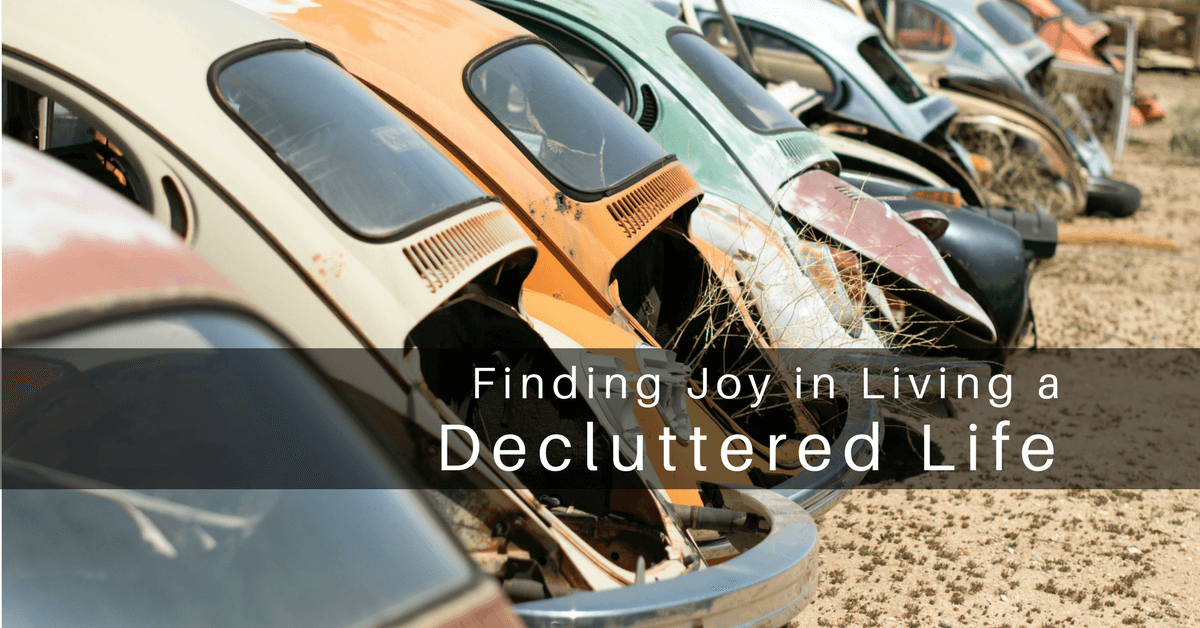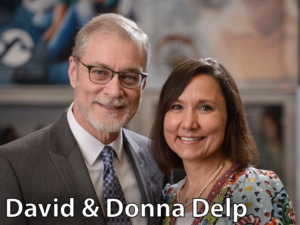
Podcast: Play in new window | Download
Our stuff, our possessions, can keep us from moving forward into the future, it can stifle our creativity and productivity, and it can anchor us in an unhealthy mentality. Our stuff is intended to facilitate us, to help us, not hinder us or hold us back in any way. Our possessions are tools, and each one of them should serve a purpose, be it functionality, utility, or memory.
We’ve already dealt with a lot of the things left over from our previous lives and relationships. We have a lot more stuff to deal with, in fact, we are in the middle of the second major wave of getting rid of stuff. There is a freedom that comes with releasing things. We gain freedom when we release old ways and old paths. We feel a new sense of freedom when we move forward in an uncluttered world. We feel free from the dark grip of past hurts when we let go of the things that take us back in an untimely and undesired way to the past.
Finding Joy in the Simplicity of a Decluttered Life
Why is this important? This is not simply about decluttering your life for the sake of productivity, though that is important and will be mentioned, but this is about experiencing the joy of living, leading, and loving. We cannot experience the fullness of joy in our lives if we are anchored to the past in an unhealthy way. We cannot experience the joy of living, leading, and loving if our focus and our heart is upon things (including equipment, buildings, and tools) rather than on the heart of what our lives and leadership should really be focused upon.
In scripture, Hebrews chapter 12 says, “Therefore, since we are surrounded by so great a cloud of witnesses, let us also lay aside every weight, and sin which clings so closely, and let us run with endurance the race that is set before us, looking to Jesus, the founder and perfecter of our faith, who for the joy that was set before him endured the cross, despising the shame, and is seated at the right hand of the throne of God. (ESV)”
This scripture in context relates the faith of those who have gone before us as an inspiration. It speaks of the sacrifices each of them made in their present lives to experience the glory of things to come. As we evaluate the things that weigh us down in this joyful race of life, we consider the sin, the things that damage our relationship with God and others, and we consider other weights, the things unnecessary for our living that hold us back from the big rocket dreams that stir our passions.
We’ve come to see physical clutter as weights that hold us down and sometimes keep us from moving to the good place we need to be in life.
[shareable]Physical clutter becomes a weight that will hold you down and keep you from realizing your dreams.[/shareable]
Many a church has died because they didn’t want their woodwork scuffed up by the hellions the pastor was importing on the bus. Fixing our sight on the seen (2 Corinthians 4.16-18) hinders us from causing transformation in the realm of the unseen and those things more important.
Our lives are governed by the patterns we set. Our leadership, the way we lead and love people, are always patterned after the way we live privately. Your leadership is worthless, in my opinion, if you are not the same person publicly as you are privately. So, the way we deal with things in our personal lives is often very indicative of our leadership, our attitudes toward people, and our attitudes toward forward movement and change.
[shareable]The way we live privately establishes the pattern for how we lead and love people publicly. [/shareable]
In other words, people who cling to and value possessions to the point that it hinders their relationships and healing, are going to be focused on accumulation and a fortress mentality in their leadership. This is the extreme, but our point is, we need to develop a generous heart and a mentality that values the dream and the people above possessions and accumulation. You see, when we get rid of stuff, stuff that has some measure of importance to us, it lessens the grip of the temporal on us. It weakens the grip of things on our lives and incrementally frees us to live the joyful life we long for.
This is about joyfully living a “right now” life. Not being unintentionally pulled back to the past. Not being held back by the constant juggling and “plate-spinning” our stuff requires us to do. We cannot have great joy unless we have it in our right now life. Memorials are important, remembering the past and the lessons of the past is important. It is important to have touchstones and memorials, but when things take us back in our emotions to the detriment of today, it is unhealthy.
This could apply to emotional baggage as well. That’s another article or podcast. As it relates to this topic, sometimes the physical reminders can pull us back into emotional bitterness and pain unnecessarily.
Sometimes we need to desensitize ourselves by exposing ourselves to things that cause pain so that we can acclimate. Other times it is just better to get rid of things. Use the sentimental objects to desensitize, take the moment to grieve one more time, then move on. We have to lay aside the weights that hold us back so we can move forward.
We can actually be more productive, more forward thinking, and more people focused by strategically getting rid of some stuff!
Why is getting rid of stuff important? [16:01]
- Our stuff sometimes anchors us in our present situation.
- Clutter hinders your ability to think and move forward.
- Our stuff is a reflection of our stewardship. When the accumulation of things hinders forward movement it reflects poor life management.
- Decluttering weakens our ties to the temporal. Where your treasure is, that’s where your heart will be.
- Too much stuff encourages anxiety. Every item you own adds something to your management load.
- An attachment to things can anchor us to the past and limit the future.
- Stuff can hinder joyful living. When stuff becomes of inordinate importance to us, we elevate it above relationships and people. Some people don’t entertain friends because they don’t want their stuff messed up. Some people don’t enjoy their grandkids because they are protecting their stuff. Stuff affects sibling relationships at the death of a parent.
Obstacles to getting rid of stuff. [23:03]
- Anticipation. We may need or want it someday. We may regret getting rid of it. We must acknowledge that we may briefly regret it at some point, but usually, we don’t think of things again once they are gone. Sometimes we do, but the freedom we gain from having less will most often outweigh any regrets.
- Sunk cost. We have too much money tied up in this stuff, we need to recoup. Sometimes we just have to acknowledge our excesses and mistakes, and divest so we can move on.
- Sentimentality. Sometimes waves of emotional pain sweep over your body while you are filling a box, but once you press through it, it’s over.
We want some things that evoke memories, but something that has been in the attic in a box may be desirable and precious to us, but it’s not helping you. Not even your kids will want it when you are gone, except perhaps to sell it. What they will want is an old ice cream scoop they remember you pulling out at every celebration requiring ice cream. or a sugar bowl that was always on the table. If they want anything it will be the things you actually used and used hard and often. They will not want most of the things to which you protected and attach sentimental significance. They will attach their own significance to things, and we must allow them to do that.
Calibration Tools… Calibrating our Lives and Lifting those we Love and Lead [31:44]
- When we lose important people or precious things it makes it easier to let go of other less precious things. What hardships or losses have changed, or should have changed your perspective of the importance of stuff?
- The “one box” rule. The keepsakes you save and store away to be remembered occasionally, should fit in only one small box.
- Take pictures of things then throw them away. This is a good intermediate step to psychologically convince yourself that you are not completely severing yourself from the memory.
- Buy less. Think out three or four months in the future, what significance, importance, or use will the item have at that time? What is the projected end of the item?
- Evaluate the things you’ve not used in the last year. Why are you keeping those items? If you don’t have a good reason, get rid of it.
- Action: Take a medium-sized box, go through your office, house, or garage and fill it. Then take it to the Salvation Army or pitch it. Note how good it feels. Repeat. Yep, you can do one more!
Finally…
The point is freedom to joyfully pursue the things in your heart and to live a healthy life. We need freedom from the entanglements, complications, or losses of the past and the things that keep us from taking risks and chasing the dreams that our passions demand.

